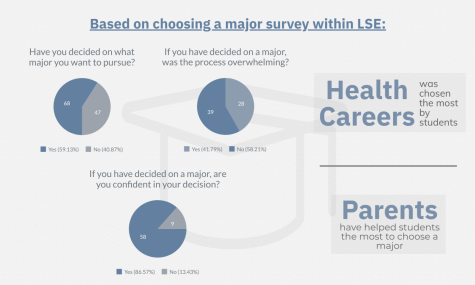Choosing the right path: How choosing a major is a big challenge for students
January 11, 2021
Every student has been asked the question of “What do you want to study in college?” While some students have already decided what they want to study for their future career, others are still trying to figure it out. With so many factors being put to play in choosing what major best fits a student, this decision can be quite overwhelming for some. Some might think, “Should I choose something that I love? Will I actually like this? Will it be worth it in the end?” These questions that arise can make a student’s decision of their future quite unknown.
As there are so many paths that can be chosen, it can be hard for a student to pinpoint one and dedicate themself to it. For students, this can be difficult to find the one that will resonate with them for the rest of their lives as their future career. There is also a misbelief that some students have that once they choose a major, they can’t turn back.
Senior Karly Codr sees how this process can be overwhelming based on her experiences.
“I think [the process] is hard because you can be set [on a major], but as you get closer to having to choose it, you ask ‘do I actually want to do that?’” Codr said.
It is pretty common that students change their intended major as they are being exposed to more fields and exploring their interests. According to Royall & Co., a business that helps colleges with their student recruitment, 52 percent of students change their intended major between the time they first take the SAT or ACT and the time they apply for college.
As students can be fluid with their decision on a major, there are many concerns that students have that sets them back. Some students realize the harsh reality that their dreams can’t always be accomplished. Money is seen as a huge issue with these concerns or realizations. With college being expensive, many don’t want to waste money on a major that won’t work out in the end. Students often question themselves if it’s worth sacrificing their happiness for something else that’s more realistic.
Kelsey Lorimer, a Lincoln Southeast (LSE) counselor, has heard a great amount of these concerns from her experiences of helping students, and she agrees that there are doubts within students’ decisions.
“Concerns that students have [with choosing a major] is having the balance of doing what you love, but also something that’s going to make money to have a good life,” Lorimer said.
Within these groups of students, there is a large handful of students who haven’t decided on any major. Based on a survey about majors that 118 LSE students took, around 41 percent of students from the survey haven’t decided on what major they want to pursue. This could be resulted by the vast variety of fields, students being indecisive, or not knowing what their true interests are.
“[Some students] have a hard time thinking about [a major] because they are so focused on what they are doing now,” Lorimer said. “There is some lack of opportunity to explore that students aren’t taking.”
When students aren’t able to choose a major, many don’t know how to seek help to guide them during the process. Students often might not even know where to get good sources of advice to help them. According to a Washington Post article titled, “Why is choosing a college major so fraught with anxiety?”, around only 11 percent of students seek guidance from a high school counselor.
One of the many pieces of advice that students hear often is to try choosing a major that you know you will enjoy or are interested in. While this piece of advice might be oversaid, it can be a great start for students to choose a major and to help students be more confident in their decision.
“I think it should be less of the thought of the money and more of the thought of ‘are you going to be happy what you are doing?’” Codr said.
There are many opportunities that students can do right now to explore their interests and discover the path that they may want to pursue. Some of these opportunities can be taking classes that are interesting to a student or seeing different fields of studies outside school. Even making a list of the things that one enjoys doing or wants to accomplish in life and doing research to see what matches is also another good starting point.
“If you can find other job shadows that you could do for areas that you’re interested in, I think it’s a great opportunity to get an idea of what a day in the life would be like for someone with that occupation,” Lorimer said.
Lorimer also recommends that when a student does a college visit, it is important to talk to someone in the department that specializes in a major that a student is interested in. This can give a student an overview of what classes they will have to take and what opportunities would be given to them.
A student’s future is somewhat unknown as life is always changing. With the lingering thought of “What do I want to do in life?”, it can make one’s future even more unpredictable. As students want to accomplish many things in their lives, it can be hard to find the right major that suits them. However, with more time and self-discovery, students can be able to find the right path they want to follow and be able to accomplish many things with satisfaction.










